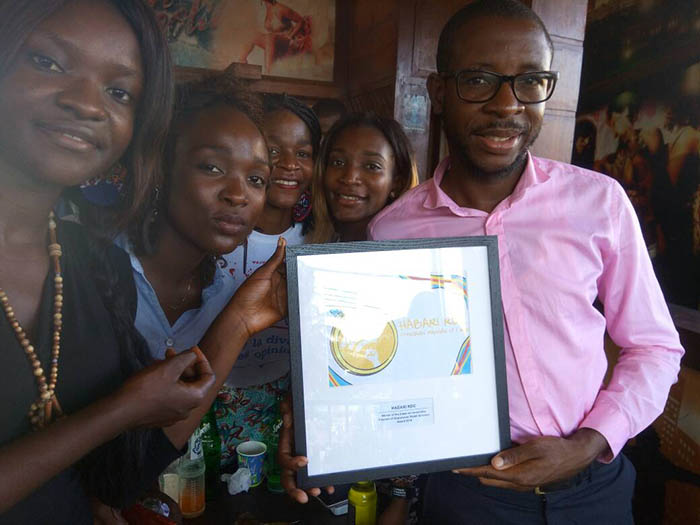[vc_row][vc_column][vc_column_text]

Staff at Habari RDC with the Index on Censorship Freedom of Expression Award for Digitial Activism
Despite the Regulator of Media for Congo forbidding the press from publishing provisional results of the 30 December 2018 general election in the Democratic Republic of the Congo, exit polls began circulating following the vote, with supporters of various political leaders trying to demonstrate that their man had won.
In response, authorities in the Congo shut down the internet and disrupted SMS services under the guise of tackling fake news. Social media companies were blocked, and Habari RDC’s internet service provider, DHI Telecom, in a meeting with our co-ordinator Guy Muyembe, made clear that they had cut our connection because they deemed our content to be dangerous.
The shutdown lasted for 20 days — from 31 December 2018 until 19 January 2019 — and had major implications for the country, except for select businesses which were allowed to retain full access. According to the Netblocks Cost of Shutdown Tool, the blocking of social media alone could have cost the country as much as $2,980,324. The shutdown also had implications for media outlets, including Habari and politico.cd, which was forced to temporarily move part of its staff to Brazzaville, the capital of the neighbouring Republic of the Congo, at significant cost.
To circumvent many of the difficulties we would face, and to ensure the continuation of publications on the site, some Habari staff in the east made their way to Rwanda so that they could access the internet without restriction. Crossing the border to Rwanda is free of charge, but staff who do not have Rwandan residency had to cross back before it closed at 10pm.
One of our editors, who was in France at the time on an internship, took over from the community manager living in Lubumbashi in the south of the country, who was responsible for our Twitter output.
Of the four Congolese cities where Habari has offices, only the one in Goma in the east of the country was partly operational. In Kinshasa, I was unable to moderate comments on Facebook or post articles. Having to confirm my identity on the social network through SMS was impossible with the service being down. Our Facebook feed, which is followed by more than 250,000 people, was mostly taken over by our webmaster living in Burundi.
Meanwhile in Kinshasa, mobile users were using sim cards from neighbouring Brazzaville. Kinshasa and Brazzaville are the two closest capital cities in the world, just four kilometres apart. Areas of Brazzaville are covered by the Democratic Republic of the Congo’s neighbouring networks without the need for a roaming service, which saw many people go to hotels and inns near the Congo River during the shutdown.
In town, cybercafes using an undeclared satellite connection (Vsat) were offering service discreetly from $0.90 an hour for a phone to $1.20 per hour for a laptop. Intelligence agents were on patrol, harassing and arresting those using social networks. In some places, people were arrested just for having access to Facebook or Twitter.
At Ngobila Beach, the main port linking Kinshasa and Brazzaville, those selling sim cards and airtime were on alert, fearing arrest. Intelligence agents posing as customers were asking questions about whether or not you had access to social networks. I experienced this myself when I was asked by a guy to set internet parameters on his cellphone. The first giveaway was that his phone wasn’t a smartphone, so unable to access the internet on 3G or 4G. Secondly, he had a very poorly hidden walkie-talkie. Agents very often had visible guns, handcuffs and walkie-talkies. Those who obliged to help them with their made up internet problems were arrested and had their phones confiscated and searched. Many would have to pay money to be released.
At Ngobila, it cost around $15 to buy a sim card (normally $2-3) and about $25 for 600 megabytes to two gigabytes of data.
Four days before the announcement of the final election results, our provider agreed to grant us connection, but without access to social networks. The Kinshasa team of Habari had to use proxies and a VPN to work. With reduced bandwidth, it only made the job more difficult. At Habari, we can’t just rely on our website because social media is a cornerstone of our connection with followers. Blocking access to Facebook and Twitter reduced our audience saw a reduction in traffic to our website and videos.
During the shutdown, our only followers able to comment were either those outside the country or those locally using the neighbouring networks such as Airtel and MTN from the Republic of the Congo. Without access, our local editors were also unable to communicate with bloggers.
The Habari offices that suffered the most during the shutdown were those in Mbuji-Mayi in the centre and Lubumbashi in the south-east of the country, where staff were mostly unreachable. Our community manager in Lubumbashi sent us a brief message saying that he was connecting from a cybercafe with poor connection. Our co-ordinator and editor in Lubumbashi had limited access in the facilities of the University of Lubumbashi, where he is an assistant.
Mbuji-Mayi, where Habari’s local co-ordinator and editor-in-chief in charge of validating all articles is based, was totally silent.
Full connection was restored on 19 January, with SMS restored some days later.[/vc_column_text][/vc_column][/vc_row][vc_row][vc_column][vc_basic_grid post_type=”post” max_items=”4″ element_width=”6″ grid_id=”vc_gid:1550831937439-9f02fd99-561b-6″ taxonomies=”28191, 24389″][/vc_column][/vc_row]




